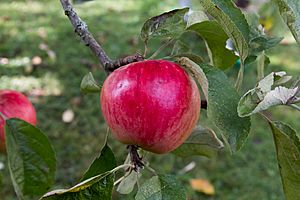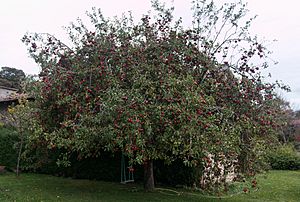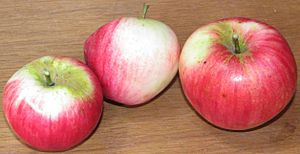Akane (apple) facts for kids
Quick facts for kids Malus pumila 'Akane' |
|
|---|---|
 |
|
| Species | Malus pumila |
| Hybrid parentage | 'Jonathan' × 'Worcester Pearmain' |
| Cultivar | 'Akane' |
| Origin | |
The Akane apple is a special type of apple that was grown by people. It is known for being one of the best apples to pick early in the season. You might also hear it called Tokyo Rose, Tohoku No.3, or Prime Red.
Contents
About the Akane Apple
Where Did Akane Come From?
The Akane apple was first created in Japan. This happened at the Morika Experimental Station. Scientists there crossed two different apple types. They used a Jonathan apple and a Worcester Pearmain apple. This new apple was then brought to the United States in 1937. It quickly became very popular there.
What Makes Akane Special?
The Akane apple tree is quite strong. It can resist many plant diseases. It grows best in warm places. But it can also handle colder weather. The flowers appear in the middle to late part of the growing season. The apples are ready to pick from early to mid-season.
Akane trees need help to grow fruit. They cannot pollinate themselves. This means they need pollen from another apple tree. This process is called cross-pollination.
What Does an Akane Apple Look Like?
Akane apple trees grow many fruits. The apples can be different sizes. Most are on the smaller side. But if you thin out some of the young apples, the others can grow larger.
The shape of an Akane apple is like the 'Worcester Pearmain' apple. It can be flat or even heart-shaped. The taste is a good mix of sweet and sharp. This makes it great for eating fresh. It also holds its shape well when you cook with it.
The inside of the apple is white. It might have a little yellow color. A great thing about Akane apples is that their flesh does not turn brown quickly. This happens when apples are cut and exposed to air. The apple is crunchy but not too hard. This makes it easy to bite into. The skin of the apple is red. Akane apples stay fresh for about one week after they are picked.
See also
 In Spanish: Akane (manzana) para niños
In Spanish: Akane (manzana) para niños
 | William Lucy |
 | Charles Hayes |
 | Cleveland Robinson |



